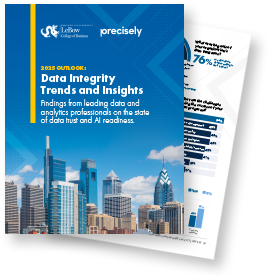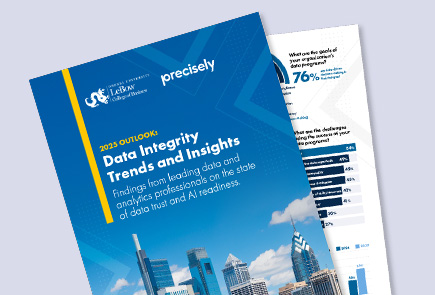
The High Price of Poor Address Data: Solutions for Better Business Outcomes

Key Takeaways:
- Poor address data can lead to missed deliveries, incorrect customer information, and wasted resources – negatively impacting overall customer satisfaction, operational efficiency, and profitability.
- Correcting bad addresses is just the beginning – you need to then connect those clean addresses to other valuable data points to unlock real value.
- Leverage solutions for address verification, geocoding, address autocomplete, and address data to improve address data quality strategies.

These days in the data world, the phrase “garbage in, garbage out” couldn’t ring truer – especially when it comes to your address data. And with data-driven decision-making more in demand than ever, businesses are increasingly reliant on accurate information to make informed decisions. One often overlooked aspect of data quality is address accuracy.
Poor address data can be incredibly costly for your business, with areas like logistics, customer satisfaction, and operational efficiency often taking the biggest hits.
Think about this: the US Postal Service suggests that undeliverable mail and packages cost businesses over $20 billion every year. But there are many uses where a single wrong address can set off a chain reaction of inefficiencies that lead to unhappy customers, lost revenue, and more – all due to inaccurate or incomplete addresses.
Read on to explore why accurate address data is so valuable, common challenges with address data quality, and proven solutions to transform your address data from a liability into an asset.
Address Data is Complex and Valuable
When you think of an address, you may only picture a location on a map. But addresses have the potential to reveal so much more for your business.
They contain rich data that can shed light on the characteristics of a neighborhood, the services available nearby, and even demographic insights. This information is invaluable for decision-making in sectors like logistics, retail, finance, and real estate.
However, addresses are complex – they vary globally in structure and components, and they may be recorded in different languages, formats, and scripts. For instance, a typical address in the United States might include a street number, street name, city, state, and ZIP code. In Colombia, though, addresses might include references to main streets, as well as markers like “between streets” to provide clearer directions.
Even within a single country, there can be thousands of new addresses added each year, each with unique nuances.
This variability makes managing address data challenging. Even a minor error, like a missing street suffix or a wrong postal code, can lead to significant downstream effects, costing you time and money.
That’s what makes it so essential to properly manage your address data – not just to avoid pitfalls, but to harness its true potential as a strategic asset. Next, we’ll take a closer look at some of the most common challenges you may encounter throughout your journey, and the solutions you need to succeed.
2025 Outlook: Essential Data Integrity Insights
What’s trending in trusted data and AI readiness for 2025? The results are in!

Poor Address Data is Expensive – in More Ways Than One
Working with address data comes with unique challenges, and poor-quality data can have far-reaching effects on your business operations. Here are three of the top challenges of poor address data and the significant consequences they bring:
- Operational errors. Address errors disrupt processes, leading to misdelivered items, inaccurate billing, and logistical setbacks. For example, in sectors like retail, telecom, and healthcare, inaccurate address data can lead to a host of logistical nightmares, impacting everything from delivery timelines to compliance with regulatory frameworks.
These errors not only create inefficiencies but also result in additional operational costs as your resources are used to correct issues.
- Customer dissatisfaction. A wrong address can lead to delayed or failed deliveries that leave your customers frustrated. For example, if shipping or food delivery services end up at an incorrect location, customers are often disappointed, inconvenienced, and unlikely to trust the brand. With all of the competition out there, even one poor delivery experience can negatively impact customer loyalty and tarnish your reputation.
- Increased return rates. Address errors lead to higher return rates, which cost your business both time and money. For e-commerce companies, failed deliveries are especially damaging, as they may involve additional shipping fees and customer support costs.
Together, these challenges underscore the importance of investing in accurate address data. For large organizations managing millions of addresses, even a small error rate can result in significant losses.
Overcoming Address Data Challenges: Proven Solutions
How many of the challenges covered above feel painfully familiar to you? The good news is that poor address data is a solvable problem.
There are several strategies and solutions at your disposal to ensure you maintain accurate and up-to-date address records. Here are four key approaches:
- Address verification checks addresses for completeness and accuracy in real time. By verifying addresses at the point of entry, you can prevent errors from entering your system and ensure your data remains reliable.
With comprehensive verification systems, businesses can validate addresses across 250 countries and territories, reducing discrepancies caused by varying global address formats.
- Geocoding connects an address to a specific physical location, often enhancing it with a unique identifier. This process is essential for location-based decisions and operations, as it enables pinpoint accuracy in your navigation and delivery planning.
Geocoding also enables you to associate addresses with points of interest, which can be valuable if you’re looking to expand or deliver personalized services.
- Address autocomplete suggestions help users enter correct addresses the first time, reducing entry errors and speeding up data input. This tool enhances user experience and minimizes inaccuracies from manual input, especially for organizations handling high volumes of address entries.
Address autocomplete can be a game-changer for companies that rely on fast, accurate customer address data for quick deliveries and services.
- Address data that’s verified and validated address provides a reliable foundation for analytics and decision-making. With high-quality address data, you can easily connect and enrich your addresses with robust context, transforming them into valuable assets.
Data enrichment allows you to append additional data points to addresses, resulting in a 360-degree view of your customers, properties, and trends.
These solutions set the stage for more efficient operations and improved customer satisfaction, thanks to their ability to simplify address data management and eliminate costly errors that set you back.
From Correction to Connection: Maximizing Address Data Value
With these capabilities in mind, it’s important to note that correcting poor address data is just the beginning.
Once addresses are validated and error-free, the next step is to connect them to other valuable data points. This approach is what truly transforms your address data into a source of insight and strategic value for your business.
Consider a real-world cautionary tale from real estate platform Zillow. Zillow’s home-flipping initiative suffered significant financial losses – a staggering $881 billion, to be exact – in part due to insufficient data context. Without complete, enriched data, the company had significant blind spots in their home assessments, including factors like the extent of repairs needed or local market trends.
Enriching your address data with unique identifiers and external datasets is key to making better-informed decisions and minimizing these kinds of losses.
The Power of One Unique Identifier
To make this connection process seamless, the PreciselyID serves as a unique “fingerprint” for each address. This ID simplifies the integration of your address data with other datasets so you can append valuable attributes, like property details or points of interest, to each address.
With over 400 datasets and 9,000 individual data attributes to choose from, the PreciselyID transforms address data into a consistent, flexible resource that you can seamlessly leverage across various departments and systems.
This ability to connect your address data with other datasets results in deeper insights that help you drive better decision-making; it enables you to reduce the time spent preparing data and avoid the high costs of onboarding third-party data – which often ends up being more than the cost to license the data to begin with.
Ultimately, correcting and connecting your address data is what helps you accelerate your time to value and unlock new opportunities that take your business and use cases to the next level.
Make Address Data Work for Your Business
Poor address data is a hidden cost for many businesses, affecting everything from operational efficiency to customer satisfaction. However, by adopting address verification, geocoding, address autocomplete, and address data, you’ll be able to overcome the obstacles that stand in your way.
Correcting and connecting address data not only reduces operational costs and customer dissatisfaction but also opens new doors for growth and innovation. When properly managed and enriched, your address data becomes an invaluable asset that drives smarter decisions and better customer experiences.
Ready to learn more? Watch the on-demand replay of Bad Addresses are Expensive: How to Overcome Poor Quality Addresses and Improve Business Outcomes, along with all of the other engaging sessions from Trust ’24: the Precisely Data Integrity Summit.
And for even more valuable insights for your data strategy, get your copy of the 2025 Outlook: Data Integrity Trends and Insights report today.



